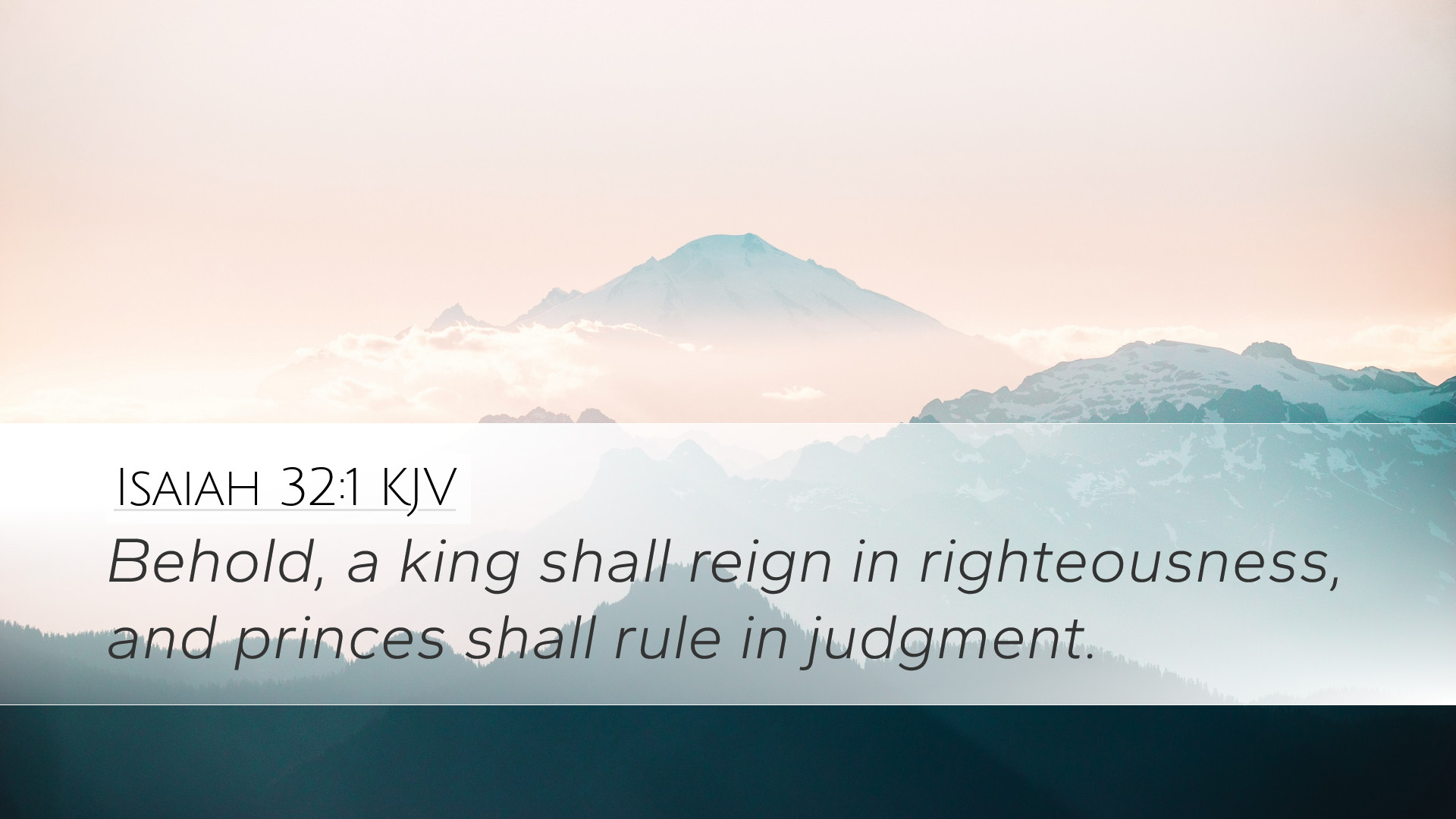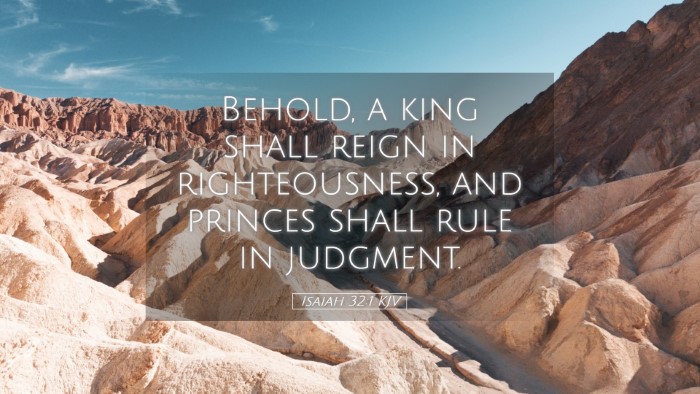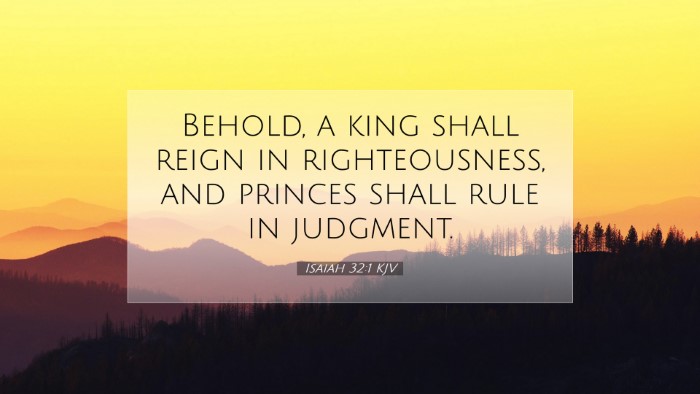Commentary on Isaiah 32:1
Isaiah 32:1 states: "Behold, a king shall reign in righteousness, and princes shall rule in judgment." This verse is one of profound significance, encapsulating the promise of just governance and the reign of righteousness. Below is an exploration of its meaning and implications, drawing insights from various public domain commentaries.
Contextual Overview
Isaiah, a prophet during the tumultuous times of the divided kingdom of Israel, speaks both of imminent judgments and future hope. This verse situates itself within the larger theme of restoration and divine leadership. The hope for a righteous king represents not only political deliverance but also spiritual renewal.
The Righteous King
Matthew Henry's Insight
Matthew Henry emphasizes the coming of a king who reigns in righteousness as a messianic prophecy. He notes that this anticipated king embodies perfect justice and governance, characteristic of divine authority. This righteousness signifies more than ethical behavior; it implies the fulfillment of God’s covenant promises to His people.
Albert Barnes' Commentary
Albert Barnes expands on the identity of this king, suggesting that it may refer to both Hezekiah and the future Messiah. He delineates that this reign is marked by peace and stability, contrasting the chaos previously experienced in Israel. Moreover, Barnes highlights that this king will not only be wise but also compassionate, ensuring equity in his judgments.
Adam Clarke's Perspective
Adam Clarke focuses on the implications of a king ruling in righteousness. He posits that such a ruler would inherently lead the people towards moral and spiritual rectitude. Clarke articulates that the reign of righteousness fosters societal harmony, as citizens align their lives with divine principles, creating an environment conducive for growth and prosperity.
Princes Who Rule in Judgment
Matthew Henry's Take on Leadership
Henry suggests that the princes, or local rulers, will also reflect the righteousness of their king. Their governance will be informed by justice rather than self-interest, indicating a systemic change in leadership paradigms. This leads to a just society where the rights of the vulnerable are upheld.
Albert Barnes on Judgment
Barnes highlights that the "judgment" exercised by these princes is not merely legalistic but deeply rooted in ethical discernment. This judgment signifies an active engagement with the needs of the people and the promotion of what is good and right. He indicates that rulers will be characterized by integrity and care for the welfare of others.
Adam Clarke on the Role of Princes
Clarke illustrates the importance of leadership in establishing a just society. He notes that these rulers will function as extensions of the righteous king, ensuring that the principles of justice and equity are not only declared but also practiced in everyday governance. Their role is pivotal in fostering trust between the leadership and the populace.
Theological Themes
Righteousness and Justice
The themes of righteousness and justice are interwoven in Isaiah's message. The anticipated reign posits a divine standard against which all human leadership is measured. Both Henry and Barnes emphasize that such governance culminates in societal flourishing, where peace prevails, and hearts are turned towards God.
Messianic Prophecy
This verse is often associated with messianic expectations, particularly in Christian theology. The identity of the righteous king is seen as fulfilled in Jesus Christ, whose reign inaugurates the Kingdom of God. This perspective invites pastoral reflection on contemporary leadership and the model of Christ's governance.
The Impact of Godly Leadership
The impact of righteous rule extends beyond political scenarios; it influences the spiritual health of a community. Adhering to divine leadership principles fosters a culture of love, mercy, and accountability. Clarke's insights remind us of the call for Christian leaders to reflect these values.
Practical Implications
For Pastors and Leaders
This verse serves as a foundation for pastoral roles—communicating the necessity of leading with integrity and justice. The engagement in societal issues reflects the heart of God for justice, thereby aligning ministry efforts with the righteous reign described in Isaiah.
For Students and Scholars
Students of scripture are called to explore the rich tapestry of biblical prophecy. Analyzing Isaiah 32:1 encourages deep theological reflection on the nature of God’s kingdom, the character of leadership, and the implications for modern governance.
Encouragement for Believers
Believers are invited to embody these principles in daily life—seeking justice, loving mercy, and walking humbly with God. This verse is a reminder of the hope we have in Christ, who represents the ultimate fulfillment of righteous rule. It encourages us to be agents of change in our spheres of influence.
Conclusion
Isaiah 32:1 presents a prophetic vision of leadership that challenges both ancient and contemporary societal norms. The insights drawn from the works of Matthew Henry, Albert Barnes, and Adam Clarke converge on a poignant truth: righteous leadership is transformative. As we look to the ultimate king who reigns in righteousness, may we strive to reflect these attributes in our lives and communities.


